Hall of Fame Class – 2023
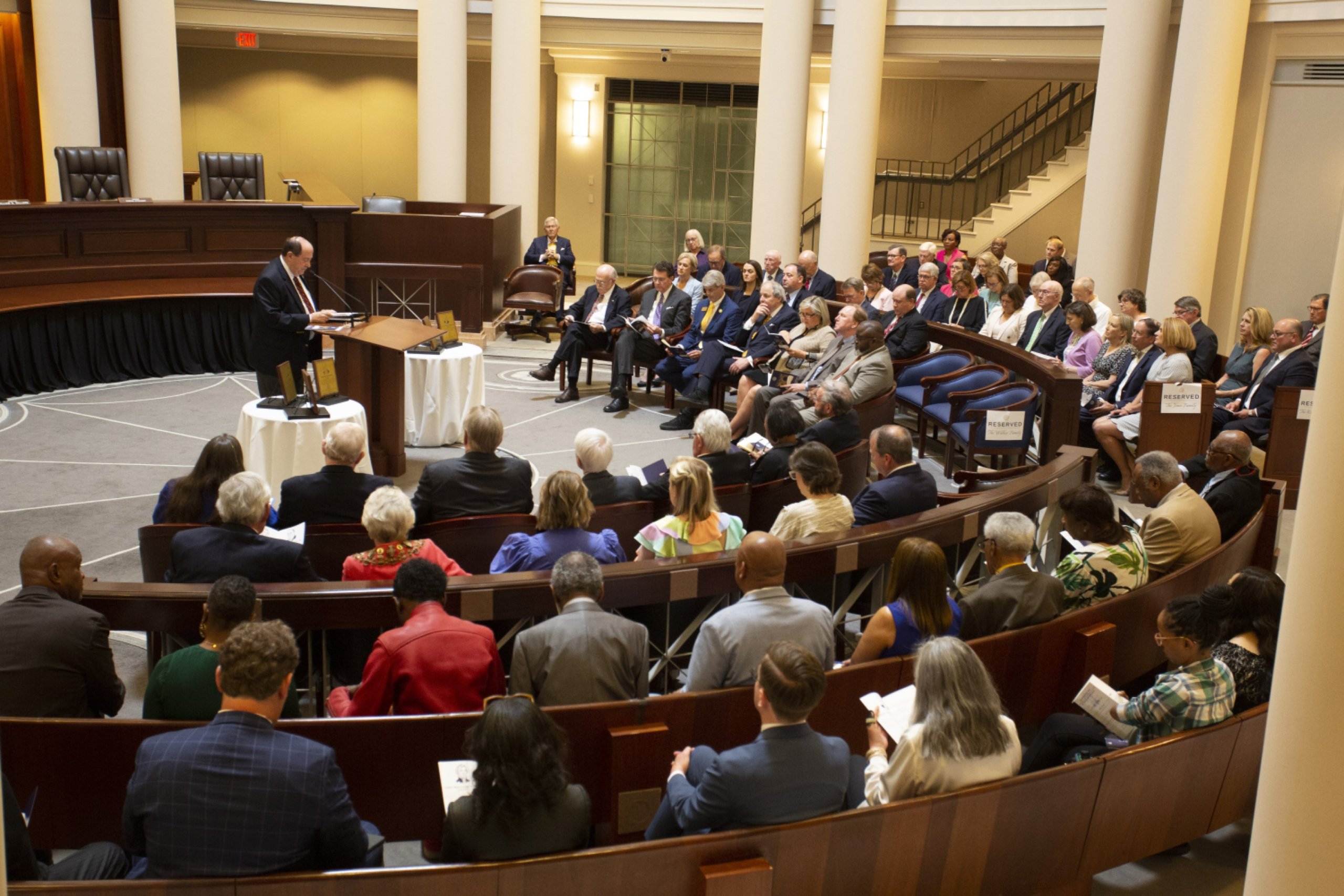
To view or download photos from the May 3, 2024 Induction Ceremony, click here. If you experience any difficulty with your photo downloads, email us here, and we will assist you!
The year 2024 marks the 20th induction ceremony for the Alabama Lawyers’ Hall of Fame. The Alabama State Bar’s Hall of Fame Selection Committee is extremely proud of this significant milestone. During the first five years of its ceremonial recognitions, from 2005 to 2009, there were four lawyer-honorees each year. However, because there were so many deserving nominees, we increased the number of our lawyers recognized from four to five each year. Therefore, with the induction ceremony on May 3, 2024, we have now honored 95 lawyers. When we choose our next five honorees for the 2025 ceremony next year, we will reach the significant milestone of 100 lawyers.
You may ask, what are the criteria for selecting candidates for the Alabama Lawyers’ Hall of Fame. Here are the standards for our choices:
- Honorees must have a record of extraordinary skill and service to the Bar and in the profession of law.
- Honorees must be Alabama lawyers who have made extraordinary contributions through the law at the state, national, or international level.
- Honorees must demonstrate a lifetime of achievement.
- Honorees need some, if not all, of the following traits to qualify:
- A breadth of achievement rather than a single achievement.
- A profound respect for professional ethics.
- A leadership role in advancing the interests of the community.
- A recognized ability to mentor, lead, or inspire others in pursuing justice.
- Only deceased lawyers will be considered.
Honorees must be preeminent exemplars of the legal profession. They have been nominated because they have had a distinguished career in the law. This is demonstrated through many different forms of achievement, leadership, service, mentorship, political courage, or professional success. Each inductee must have been deceased at least two years at the time of their selection. And then comes another challenge. Among the honorees, at least one must have been deceased a minimum of one-hundred years. This means that no one will have known the potential honoree personally and the committee will be solely dependent on history books, written records, and the results of their deeds subject to the judgment of time. Thus, the committee considers the totality of a person’s life. That places a tremendous responsibility on the committee and requires a significant amount of historical research.
Over the years we have recognized men and women, black and white attorneys, members of the Supreme Court of the United States and the Supreme Court of Alabama, other judges, both appellate and trial, both Federal and State, military heroes, public servants, law professors, a Clerk of the Alabama Supreme Court and Reporter of Decisions, Assistant U. S. Attorneys, Governors, Senators, Congressmen, Mayors, City Councilors, an Ambassador, Speakers of the Alabama legislature, a Speaker of the United States House of Representatives, and a Vice-President of the United States. But our largest single demographic is the group of lawyers, all outstanding individuals, who have labored in the field of private practice. All of our lawyer-inductees are the true giants, the mentors, and, yes, the heroes of our profession. Their plaques are located in the lower rotunda of the Heflin-Torbert Judicial Building and together they form a very impressive collection.
A twelve-person panel serves as the Selection Committee for the Hall of Fame. The twelve members are:
- The Director of the Alabama Department of Archives and History.
- Four persons named by the Board of Bar Commissioners for a term of three years.
- The Immediate Past President of the Alabama State Bar.
- The Executive Secretary of the Alabama State Bar or his/her designate.
- One person nominated by the Chief Justice of the Alabama Supreme Court.
- One person nominated by each of the three presiding Judges of the Federal District Courts of Alabama for a term of three years.
- A representative of the Alabama Bench and Bar Historical Society.
I encourage anyone to consider making a nomination for our Alabama Lawyers’ Hall of Fame. The nomination form and instructions can be found on the Alabama State Bar’s website. I say this each year, but remember, great lawyers cannot be considered for this honor if they have not first been nominated.
Here are the new inductees to the Alabama Lawyers’ Hall of Fame. We hope that all of their stories and achievements will serve to inspire the present and future citizens of Alabama.
-Samuel A. Rumore, Jr. – Chair, Alabama Lawyers’ Hall of Fame Selection Committee
- John Williams Walker (1783-1823)
-
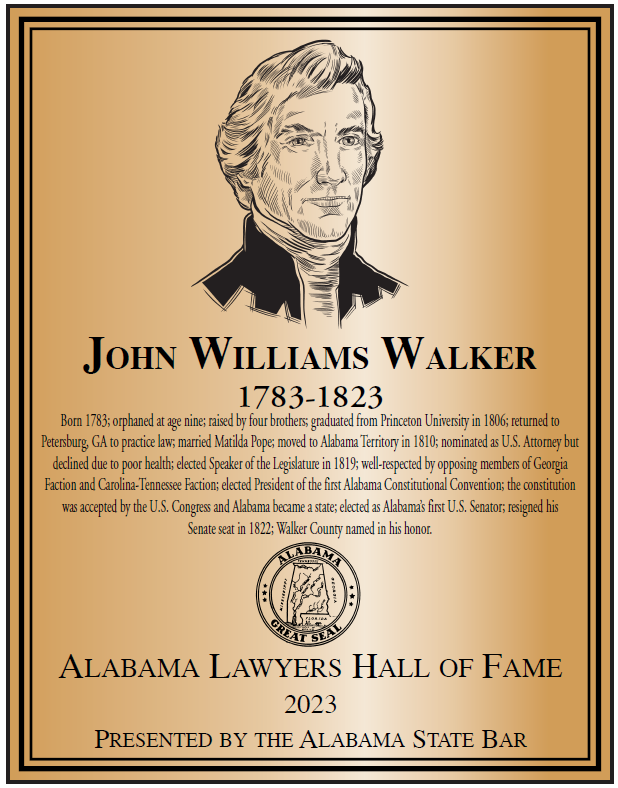
John Williams Walker was born on August 12, 1783 in Amelia County, Virginia, to the Reverend Jeremiah and Mary Jane Walker, devout Baptists, who were persecuted for their beliefs in the predominantly Anglican area of Virginia where they first lived. They later moved to Petersburg, Georgia, where large sections of cheap land were available. Shortly after the move, both Reverend Walker and his wife died from tuberculosis, leaving John an orphan at age nine. He was raised by his four brothers. John attended Moses Waddell Academy and Princeton University, where he was an excellent student and prolific writer on the subjects of religion, philosophy, and politics. During this time, he himself was afflicted with tuberculosis and acquired a somewhat fatalistic approach to life and achievement. Still, he persisted in his studies and graduated from Princeton with honors in 1806, returned to Petersburg to practice law, and married Matilda Pope, daughter of Leroy Pope, one of the town’s most prominent and enterprising landowners.
Because tobacco cultivation had depleted the lands around Petersburg, many of its residents followed the Popes and the Walkers to the Tennessee Valley area of the Alabama Territory in 1810 in search of better farmland. Soon they became the political elite in the Territory and were known as the Broad River faction. Walker, as a member of the faction, was considered for appointment as Territorial Secretary and was even suggested for appointment as Governor of the Alabama Territory. He was nominated as U. S. Attorney but turned down the position due to his poor health. He was also nominated to be a District Judge of the Federal Court, but also turned down that position. In 1818 he was chosen to be a member of the Territorial legislature. And in 1819 he was selected as Speaker of the legislature.
Walker was well-respected by members of the Georgia Faction as well as the opposing members of the Carolina-Tennessee Faction in the legislature. He was the person who could bring the two sides together. He also had the political connections through his friend, Senator Charles Tait of Georgia, to have an Enabling Act introduced and approved in Congress to allow the Alabama Territory to proceed with the necessary steps to become a state.
The first Alabama Constitutional Convention was held in Huntsville in the summer of 1819. Just a few days before it was to convene, President James Monroe made an unannounced visit to Alabama. The President held John Williams Walker in such high esteem that his first stop in Alabama was at Walker’s Meridianville home. Following the visit, the Convention elected Walker its President. With his guidance and influence, the Alabama Constitution, considered quite progressive for the time, was accepted by the United States Congress, and Alabama became a state on December 14, 1819. Subsequently, John Williams Walker was elected as Alabama’s first United States Senator.
Walker insured his political popularity as a Senator when he championed the Land Relief Act of 1821. This law provided some relief for those who had purchased land in the new state on credit and gone into debt beyond their means to repay. This condition was created due to unfair speculation, which had driven land prices up inordinately as land came on the market. Then it was coupled with an economic downturn in 1819 just as the land purchase bills came due. It was estimated that Alabama landowners owed half of the national land debt.
Due to his failing health, John Williams Walker resigned his Senate seat in December 1822. He died on March 27, 1823 at the age of 39. In the short span of his life, Walker was able to accomplish much: Speaker of the Alabama Territorial Legislature in 1818, President of the first Alabama Constitutional Convention in 1819, and Alabama’s first United States Senator. Had he lived longer and not suffered from tuberculosis, he could have easily done much more, perhaps even to become President of the United States. He left a legacy of five sons, who played prominent roles in Alabama’s history. In recognition of his service to the State of Alabama, Walker County was named in his honor nine months after his death. The lawyers of Alabama are now proud to induct him into the Alabama Lawyers Hall of Fame.
- Ralph I. Knowles, Jr. (1944-2016)
-
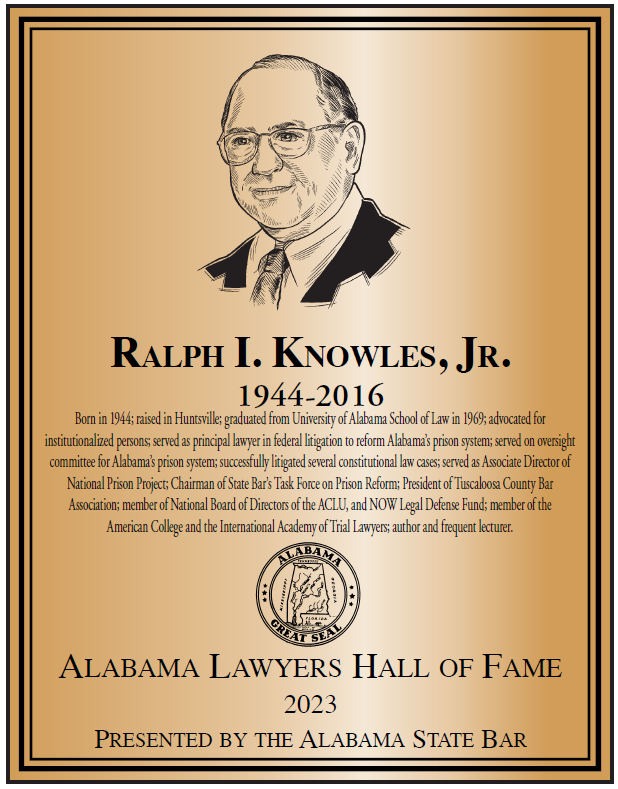
Ralph I. Knowles, Jr. was one of the South’s preeminent lawyers in every respect and spent over 45 years defending civil rights and civil liberties. Born in North Carolina, Ralph grew up in Huntsville and was educated at the University of Alabama where he served as President of the Student Body and graduated from the Law School in 1969.
Over the course of his legal career, Ralph practiced law in Alabama, the District of Columbia, and Atlanta, Georgia. In all three locations Ralph distinguished himself through his service to the Bar and as an advocate for institutionalized persons and others whose rights had been abused. He was the principal lawyer in federal constitutional litigation to reform Alabama’s prison system and, in a different decade, served on the court-appointed oversight committee for Alabama’s prison system. In the course of his Alabama practice years, Ralph also brought litigation which resulted in several state statutes being declared unconstitutional by federal courts. The amazing and rare nature of Ralph’s involvement in major constitutional litigation is that he also maintained a normal law practice handling divorce, personal injury, and criminal cases at the same time.
He began his law career as a staff attorney with the Selma Inter Religious Project, a group established by several national religious organizations after the Selma to Montgomery March. Through his work he opposed racial segregation practices across Alabama’s Black Belt. He established a private practice in Tuscaloosa and, with his partners, developed unique legal theories that helped establish precedents involving civil rights, prisoner rights, mental health reform, and the rights of the poor.
Throughout his life, Ralph showed great moral, and at times, physical courage. In the early 1970’s he defended Southern Christian Leadership Conference demonstrators in Choctaw and Wilcox counties. During this volatile period in Alabama’s history, peaceful demonstrators against the status quo of segregation faced imminent dangers such as in Butler, Alabama where a 15- year-old child was hit by a car and killed while she took part in a demonstration. And Ralph himself even became a target in Camden, Alabama when he was shot at after he walked out of the Wilcox County Courthouse. Although the bullet missed Ralph, it struck the person standing next to him.
During the late 1970’s, Ralph moved to Washington DC with his wife Marjorie Fine Knowles when she was appointed the first Inspector General of the Labor Department under President Carter. While in Washington, Ralph served as Associate Director of the National Prison Project where he litigated several significant cases in this area of developing law.
He returned to Tuscaloosa and practiced law with his classmate and former law partner, Jack Drake, for many years. He was Chairman of the State Bar’s Task Force on Prison Reform and on Judicial Election, Selection, and Evaluation. He served as President of the Tuscaloosa County Bar Association. He was also Chairman of the Tuscaloosa County Bar Grievance Committee and a founding member of the local chapter of the Inns of Court.
When his wife, Marjorie, was selected as Dean of the Georgia State University Law School, Ralph joined the Atlanta law firm of Doffermyre, Shields, Canfield & Knowles LLC where he became one of the most active lawyers in personal injury class actions including service as Co-chairman of the Plaintiff’s Steering Committee in the breast implant litigation and as a member of the Plaintiff’s Steering Committee in the latex glove litigation. He was also involved in numerous ground breaking environmental cases and in a wide variety of other cases including fraud in the sale of contact lenses, fraud in credit life sales, and defects in intrauterine devices. Through the years, Ralph authored a number of professional articles and spoke frequently to professional organizations on subjects involving complex civil litigation.
Ralph was a member of the National Board of Directors of the ACLU and the NOW Legal Defense Fund. He was selected for membership in the American College of Trial Lawyers and the International Academy of Trial Lawyers.
Ralph Knowles was a unique person who devoted his legal career to protecting the disadvantaged and the exploited through ground-breaking litigation that had a major impact on our society. He was truly a great lawyer whose positive contributions in legal battles against flagrant violations of human rights stand as an exemplar for the legal profession. He always tried to do the right thing. He is now recognized by the Alabama State Bar as a member of its Lawyers Hall of Fame.
- Thomas Logan Jones (1931-2017)
-
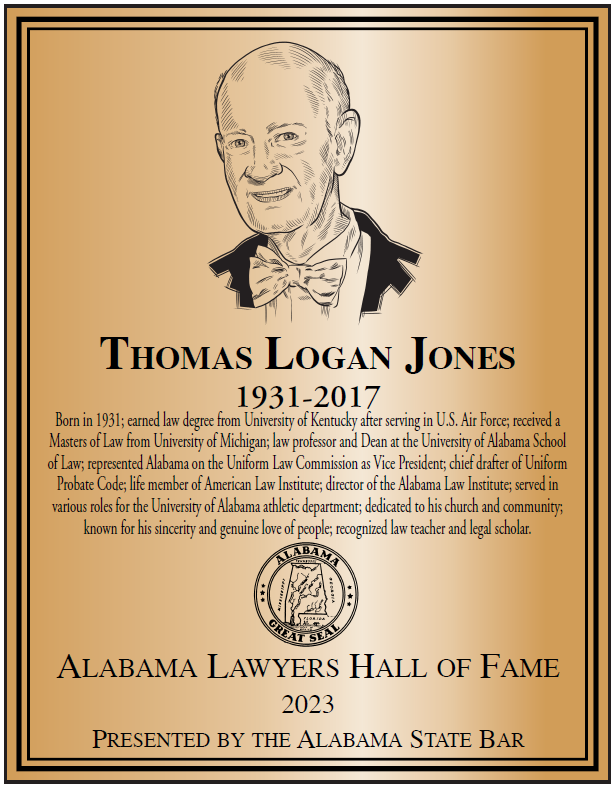
Thomas Logan Jones was born April 10, 1931 in Garfield, Kentucky and died on August 27, 2017 in Tuscaloosa, Alabama, his home since joining the faculty of the University of Alabama School of Law as an Assistant Professor in 1962. He earned his undergraduate degree and law degree from the University of Kentucky after serving in the United States Air Force. He received a Masters of Law from the University of Michigan.
Professor Jones had a passion for teaching and he was first and foremost a law teacher. Three generations of Alabama lawyers benefited from his dedication. His approach focused not only on teaching “law”, but also on its application. Students found reassurance in his always having time to listen, advise and guide with obvious real interest and respect. It was not surprising that his students loved and respected him.
Tom Jones was not an isolated legal scholar. He spent a great deal of his life as an ambassador of the State of Alabama to the national legal community. For over fifty years he represented Alabama on the Uniform Law Commission, serving as its Vice President. He was the chief drafter of the Uniform Probate Code that has been adopted in virtually every state. He was a Life Member of the American Law Institute. He was active on the Executive Committee of the Association of American Law Schools. He was a Fellow of both the American Bar Foundation and the Alabama Law Foundation. He was called upon to lead the Alabama Law Institute, the official law development agency of the State of Alabama. Its office suite at the UA School of Law was named for Tom and an endowed scholarship was established in his honor. A Legislative Resolution recognized him as “One of the greatest influencers of Alabama law”.
Tom Jones’ talent was utilized by the University of Alabama System when he was given an interim appointment to its legal staff. He was later named the Faculty Representative on a Presidential Search Committee in the 1980s. Two University Presidents appointed him to vital positions involving UA athletics. He was first named to the Faculty Chair of Athletics, and later given the additional duty as Interim Athletic Director. The Alabama Credit Union benefited from Tom’s service as a director for over fifty years. While President, Tom led the organization in acquiring its first official office. The credit union serves the needs of the faculty and staff of the University, having originally operated from space in an academic building. The University Club was another beneficiary of Tom’s talent and good judgment. It was during his Presidency that the University Club achieved the level of stability it enjoys today in serving the University and the City of Tuscaloosa.
This son of a Presbyterian minister found a church home in Tuscaloosa’s First Presbyterian Church where he faithfully served in every position a layman could hold. Professor Jones was also a Charter Member and later President of the Greater Tuscaloosa Kiwanis Club. He and his wife, Shelley, were both honored in numerous ways for their contributions as engaging citizens in the Tuscaloosa community, where their only desire was being able to make a positive difference.
As a man of unquestioned integrity, a false allegation challenging that character by the National Collegiate Athletic Association while he was serving as the Faculty Chair of Athletics was a painful experience. Friends from all walks of life who had known Tom rallied to his defense, not the least of whom were his former students and University colleagues. Ultimately, the NCAA exonerated Tom of any rule violation with a public apology. This was the first time the NCAA ever publicly acknowledged its wrong doing. It did so in a national press event from the NCAA headquarters, and also made a financial settlement with Professor Jones.
The many letters in support of Dean Jones’ selection today, while praising the important roles he played professionally in his sixty-five years in Alabama were replete in praising his sincerity and his genuine love of people. He was an exemplar of how to act and live in nearly every aspect of life. Tom dedicated his life to cultivating all that is truly good and noble about the legal profession.
Thomas L. Jones, teacher, administrator, leader, servant, churchman, good citizen and friend to many, by the life he lived, taught us what it means to be truly human. The Alabama State Bar is honored to induct Thomas Logan Jones into the Alabama Lawyers Hall of Fame.
- J.L. Chestnut, Jr. (1930-2008)
-
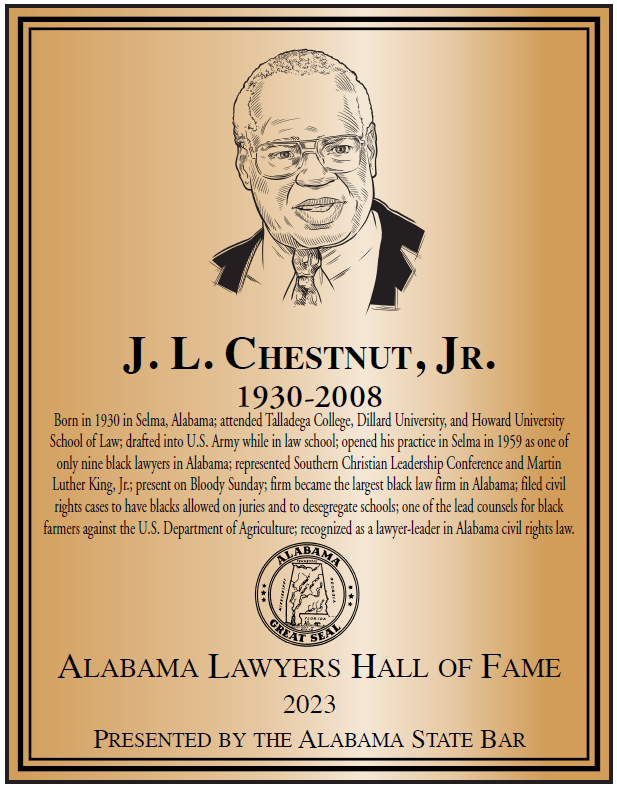
J.L. Chestnut, Jr. began his remarkable 77-year life in the heart of the Jim Crow South. Born in Selma on December 16, 1930, he died on September 30, 2008. He was one of the country’s leading civil rights attorneys and the first black attorney in Dallas County. The lessons he learned in Selma as a child served him well in his career and service to the country.
He was born in his grandparents’ home and named after his father, whose name was J.L. These were not merely initials. (Chestnut was later known as “Chess” to friends and associates). A card shark and a musician in his teens, J.L. frequently said that he discovered as a teenage gambler that “it is far easier to beat a person who expects to get beat than one who comes to win because the former will give up somewhere along the line.” He also learned that “power was most effective when you didn’t have to use it, when folks just assume you’ve got it.”
J.L. played the saxophone throughout his youth, believing that jazz music was good for one’s health. After high school, he first attended Talladega College in North Alabama. Talladega was then considered the Black Harvard of the South, possibly because many students from wealthy black families all over the country were enrolled there. He later transferred to Dillard University in New Orleans where he could indulge in both his passions, learning and music. After undergrad, J.L. attended Howard University School of Law, and in the same year married his high school sweetheart, Vivan. Shortly after the marriage he got a job as a disc jockey at radio station WOOK. One of the Deans at Howard learned about his job and expressed to J.L. that a disc jockey job was not appropriate for a law student. Chestnut changed the Dean’s mind once he explained that the disc jockey job paid more than the Dean’s salary.
Howard Law gave Chestnut the opportunity to work with some of the top African American attorneys in the nation on one of the most essential Civil Rights cases, Brown v. Board of Education, the case that outlawed segregation in public schools. He also worked with Thurgood Marshall, Herbert Reid, Robert Carter, and many others who were all on Howard’s faculty. Later, when J.L. worked for the NAACP Legal Defense Fund, Thurgood Marshall told him that he didn’t think playing the saxophone and being an attorney was a good mix, but he wasn’t worried much about Chestnut since Chestnut was not a very good saxophone player.
J.L. was drafted into the Army while in law school. After two years in the military, he finished law school at Howard in 1958. He returned to Selma and opened his law practice in 1959, where he was one of only nine black lawyers in Alabama. He started working with other black lawyers on Civil Rights cases for the NAACP Legal Defense Fund in the Black Belt and across Alabama.
Chestnut began organizing nonviolent demonstrations in Selma, and from 1963 to 1965 he represented the Southern Christian Leadership Conference and its President, Martin Luther King, Jr. He was on a team of legal counsel for the Selma to Montgomery Voting Rights Marches and was present on Bloody Sunday. The Voting Rights Act of 1965 was a result of this organized movement and the national attention that Selma’s citizens brought to their disenfranchisement.
After these successes, J.L.’s law firm became the largest black law firm in Alabama and one of the largest in the Southeast. He filed civil rights cases to have blacks allowed on juries, to desegregate public schools, and to ensure blacks the opportunity to be coaches and principals in desegregated schools. J.L. recalled that before Judge George Wallace became the segregationist Governor of Alabama, he was the one Judge who treated him with respect and insisted that others do so as well. Chestnut stated that Judge Wallace was the most liberal Judge he had ever practiced before and was the first Judge to refer to him as “Mister” in an Alabama courtroom.
Chestnut later gained further national acclaim as one of the lead counsels for Black farmers against the U.S. Department of Agriculture in the late 1990s. Thousands of black farmers filed suit claiming that they were discriminated against for decades by being denied subsidies and other assistance. The case was adjudicated in 1999 and eventually settled with nearly $6 billion in reparations paid to black farmers.
J.L. Chestnut would often say that leaders come our way when we need them. The Alabama State Bar recognizes his leadership and inducts this lawyer-leader into its Lawyers Hall of Fame.
- Albert Preston Brewer (1928-2017)
-
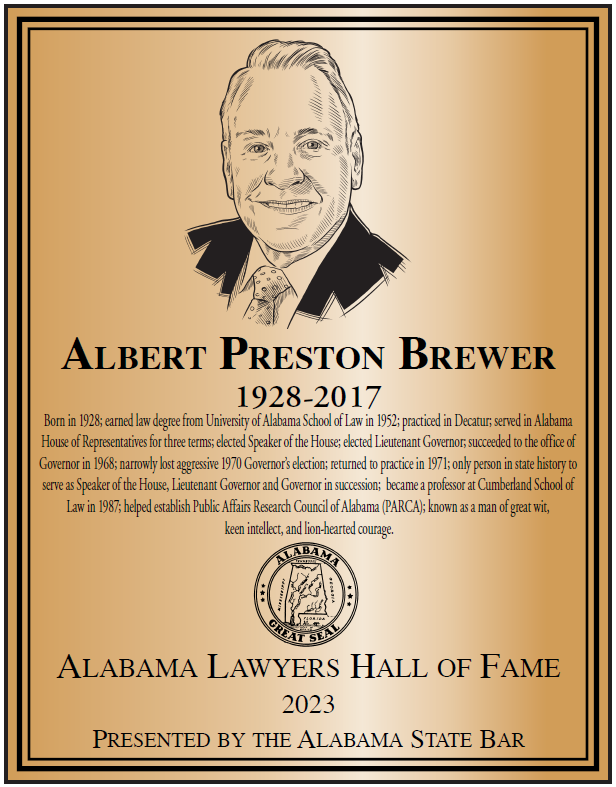
Albert Preston Brewer was born on October 26, 1928, in Bethel Springs, Tennessee, to Daniel A. Brewer and Clara Albert Brewer. While Albert was a child, the family moved to Decatur so his father could take a job with the Tennessee Valley Authority. There, the young Brewer attended local public schools and developed a love of civics and history. After graduating from high school, Brewer enrolled at the University of Alabama where he majored in history and political science. He went on to earn his law degree from the University of Alabama School of Law, graduating in 1952. While in law school he married Martha Helen Farmer. Upon graduation, Brewer returned to Decatur to practice law where he was soon involved in community service.
In 1954, the incumbent legislator serving Morgan County in the Alabama House of Representatives announced his retirement. Brewer decided to run, encouraged by Morgan County civic and political leaders. He won the Democratic Primary and faced no opposition in the general election. He was reelected in 1958 and 1962.
At the opening of the 1963 legislative session, Brewer, supported by Governor-Elect George C. Wallace, was elected Speaker of the House of Representatives. As speaker of the House, Brewer, and the House itself, were generally, but not totally, supportive of Wallace’s policies.
In 1966, Brewer considered running for Governor since Governor Wallace was forbidden by the Alabama Constitution from seeking a second consecutive term. When Lurleen Wallace, Governor Wallace’s wife, announced that she would seek the Governor’s office, Brewer decided to run instead for Lieutenant Governor. The popular Brewer overwhelmingly defeated his two opponents in the Democratic Primary and faced no opposition in the general election. He was sworn in on January 16, 1967. Lurleen Wallace also won and was inaugurated that same day.
Though aware of Lurleen Wallace’s affliction with cancer, Brewer did not know the severity of her condition until shortly before she died on May 7, 1968. As required in the Alabama Constitution, Brewer succeeded to the office of Governor. In keeping with Brewer’s character, he delayed moving into the Governor’s mansion until Wallace had found a new home for his family.
Governor Brewer’s administration was unlike his two predecessors. For example, Governor Brewer held weekly press conferences to announce significant initiatives including an executive order creating an Ethics Commission tasked with drafting a Code of Ethics for potential adoption by the legislature. Governor Brewer encouraged industrial recruitment. He created the Alabama Development Office to help local governments get federal grants. Through his efforts, more than 45,000 jobs were added to Alabama’s workforce. Brewer’s other initiatives included improving education, stream-lining Alabama state government, and improving Alabama’s national image. Unlike his predecessors, he pledged to respect any court orders on racial matters.
In 1970, Governor Brewer entered the Governor’s race. He faced former Governor George Wallace who had privately and publicly stated that he was not going to run. Governor Brewer led the Democratic Primary but failed to win an outright majority. Brewer faced Wallace in a runoff. Wallace, known for his race-baiting, ran a very aggressive campaign using racist rhetoric against Governor Brewer and his family. Wallace narrowly won the Democratic runoff with 51.6 percent of the vote to Brewer’s 48.4 per cent and won the general election by a wide margin. Governor Brewer was succeeded by Wallace on January 18, 1971.
Governor Brewer returned to the practice of law, first in Montgomery, and then in Decatur. Brewer ran for Governor again in 1978 but was defeated in the 1978 Democratic Primary. Yet Brewer had much to be proud of in his 987 days in office. During that time, he accomplished more reform than most Alabama governors accomplish in 4 years. He is the only person in state history to serve as Speaker of the House, Lieutenant Governor and Governor in succession.
In 1987, Governor Brewer began a long and productive association with Cumberland School of Law at Samford University in Brimingham. He taught Professional Responsibility at Cumberland Law School for many years. No person was better equipped to teach a course on ethics and integrity than the man who embodied both those characteristics. Brewer also chaired the Constitutional Revision Commission for the State of Alabama and was responsible for the establishment of the Public Affairs Research Council (PARCA) at Samford University.
Everything above is about Governor Albert Brewer’s accomplishments in his long public service to Alabamians. But what about the man himself? According to one Alabama attorney, Brewer combined the best qualities of two lawyer-exemplars: Thomas More the Saint and Atticus Finch the ideal model from To Kill a Mockingbird. He was a man of great wit, keen intellect, and lion-hearted courage. He is now a member of the Alabama Lawyers Hall of Fame.